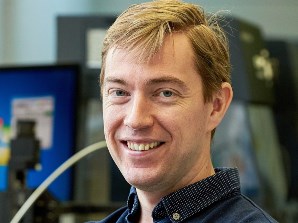
James Mclaughlan
Dr James Mclaughlan completed his PhD at the Institute of Cancer Research, London in 2008. He currently is an associate professor at the University of Leeds where he specialises in developing novel technologies for cancer imaging and therapy.
James’s PhD project focussed on high-intensity focused ultrasound (HIFU), which uses high-frequency ultrasound to heat and destroy cancer cells, exploring if using microbubbles could help improve its therapeutic effectiveness. As a physicist, he was particularly attracted by the opportunity to work within the multidisciplinary environment at the ICR.
“There’s such a wide scope of expertise, it very much opens your horizons,” he says. “When people with different skill sets come together, you can solve problems in ways that you wouldn’t have thought of on your own.”
After completing his PhD, he carried out postdoctoral research at Boston University, USA, where he investigated the use of light-absorbing nanoparticles for cancer imaging and therapy. In 2010, he joined the University of Leeds as part of a multidisciplinary team engineering therapeutic microbubbles for treating bowel cancer. Two years later, he was awarded a Leverhulme early career fellowship for a project combining nanoparticles with light and sound to identify and treat early breast cancer. Currently, he is working on the treatment of head and neck cancers with this technology, supported by an EPSRC fellowship.
He now holds a joint position between the faculties of Engineering and Physical Sciences (EPS), and Medicine and Health, where he aims to develop minimally invasive technology for cancer imaging and therapy. “Ultimately, I would like to see these technologies to be used routinely on patients,” he says.
While James’ PhD provided him with a good basis to progress the rest of his academic career, he also enjoyed the social environment at the ICR.
“It was a nice community to be part of, with plenty of activities to get involved in,” he recalls. “I particularly enjoyed helping to refurbish the pH bar – and my team also won the mini-Olympics a few times!”